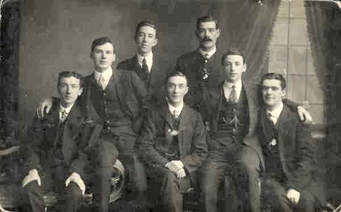A brief history of men's work

In previous times Men's and Women's roles, work and social spaces were more defined along gender lines. Men worked together doing men's stuff. These were spaces where men felt some kind of support and found their Rites of Passage into manhood. In some older shamanic cultures there would be a Men's House and a Women's House where the adolescents went to learn to be adults. The elders retired into this support where their wisdom was valued. These were also places for single or divorced adults to live in the support of their community.
The modern Men’s movement is wide and varied, much like the Women’s movement. In fact several of the approaches to Men's groups emerged as responses to the Women's movement and women's empowerment in the early 1970's. Some of the approaches include: groups defending the rights of divorced fathers, pro-feminist men's groups, the Men’s Sheds, the Jungian mythopoetic groups, wide-ranging sociological gender projects and many others. Some of these already have a clear idea of the “problems and solutions” whilst others have their particular system for helping men to feel secure. All of these are valid and we might draw on their experience from time to time. Some links to these are found in the resources page.
Our objective in “Men in Movement” is simpler, humbler ... it is principally just to listen, to explore and learn together. We re-create a modern Men's House where men can explore ourselves in a safe environment. Just listening might seem simple but our ears and eyes have been distorted over many generations. Our usual listening is via a set of filters, product of generations of patriarchy, white, European, Christian, capitalist, homophobic, ... etc. norms that limit our capacity to just really listen to each other.
Bearing this in mind we try to start from where we are, conditioned, hurt, often confused, wanting to be ‘good men’, defending our personal neurotic concepts of reality. We listen to all of this. We listen to our inability to listen beyond our conditioned filters. We also try to bear in mind that there is continual interaction between 'biological determination' and 'environmental determination'. Biology decides which environmental factors are important at different stages of neuro-physical development and how they will influence this development. Environment gives all the rich texture of sensorial, chemical, physical, social, cultural, emotional and cognitive information that then shapes neuro-biological development.
The modern Men’s movement is wide and varied, much like the Women’s movement. In fact several of the approaches to Men's groups emerged as responses to the Women's movement and women's empowerment in the early 1970's. Some of the approaches include: groups defending the rights of divorced fathers, pro-feminist men's groups, the Men’s Sheds, the Jungian mythopoetic groups, wide-ranging sociological gender projects and many others. Some of these already have a clear idea of the “problems and solutions” whilst others have their particular system for helping men to feel secure. All of these are valid and we might draw on their experience from time to time. Some links to these are found in the resources page.
Our objective in “Men in Movement” is simpler, humbler ... it is principally just to listen, to explore and learn together. We re-create a modern Men's House where men can explore ourselves in a safe environment. Just listening might seem simple but our ears and eyes have been distorted over many generations. Our usual listening is via a set of filters, product of generations of patriarchy, white, European, Christian, capitalist, homophobic, ... etc. norms that limit our capacity to just really listen to each other.
Bearing this in mind we try to start from where we are, conditioned, hurt, often confused, wanting to be ‘good men’, defending our personal neurotic concepts of reality. We listen to all of this. We listen to our inability to listen beyond our conditioned filters. We also try to bear in mind that there is continual interaction between 'biological determination' and 'environmental determination'. Biology decides which environmental factors are important at different stages of neuro-physical development and how they will influence this development. Environment gives all the rich texture of sensorial, chemical, physical, social, cultural, emotional and cognitive information that then shapes neuro-biological development.